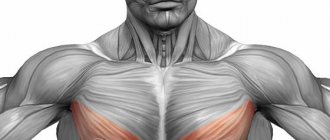The fitness industry has a tendency to divide things into polar opposites, leaving a huge space of possibilities in between.
For example, many fitness enthusiasts see foods as "clean" or "dirty"; there is no middle point in their minds.
Thus, it is not surprising that the question of protein requirements for muscle growth follows suit.
With all the conflicting information and "science" touted on the internet, it can be a confusing and frustrating process to find your optimal protein intake for muscle gain.
With that in mind, let's take a closer look at what makes sense, both scientifically and anecdotally, regarding what amount of protein is optimal for muscle development.
Briefly: what is protein?
Protein is the building material for our muscles. It is vital for building muscle cells (muscles). Protein (protein) is considered the main substance in the human body, after water. Muscles, hair, nerves, skin, etc. are built from protein. it is in the blood, enzymes, hormones, etc. In general, protein is vital for a person (especially a bodybuilder).
Protein is also the main structural component of the cell; it is used to preserve, develop and, so to speak, “repair” the tissues of the human body, and is also a source of additional energy.
In principle, if you have read my previous issues, then you should already know all this, this is, so to speak, a small background so that people understand what we will actually be talking about today. And so we figured out what protein is, let’s move on to the main part of our article today.
Protein in bodybuilding
Proteins are our building material... without it, muscle growth (as I said earlier) is impossible.
The body needs it to build new muscle cells (muscles) and heal (restore) old ones, which are regularly (after all, we train not once a month, but almost every day, day after day) are injured during training.
Protein is the main substance in the body, after water.
Protein is used to build muscles, skin, hair, organs, and nerves. It is present in hormones, enzymes, and blood.
The amino acid composition of a protein is completely determined by 20 amino acids (9 of which are non-essential, i.e. they are not synthesized by the body itself, and 11 of which are replaceable):
- Replaceable: alanine, argenine, asparagine, aspartic acid, glycine, glutamine, glutamic acid, proline, serine, tyrosine, cystine.
- Essential: leucine, isoleucine, valine, lycine, histidine, methionine, threonine, tryptophan, phenylalanine. <= these amino acids must necessarily come from outside with food (since the body itself does not synthesize them). This is a very important point... a lack of essential amino acids can cause delays in human development, let alone bodybuilding, where we can confidently say that a lack of essential amino acids will not allow the potential of development and improvement of the body to be realized.
The optimal ratio of essential amino acids differs for each person, because... it depends on gender, age, lifestyle and other characteristics of a particular organism.
But in general, the following ratio of 1000 mg of protein is considered optimal for an adult male:
- Isoleucine – 40 mg
- Leucine – 70
- Lysine – 55
- Methionine + cystine – 35
- Phenylalanine + tyrosine – 60
- Tryptophan – 10
- Threonine – 40
- Valin – 50
In general, the most important amino acids for the body (body) from a metabolic point of view are: leucine, isoleucine and valine.
All three amino acids are representatives of the so-called BCAA class, and for those who are not in the know, BCAA amino acids play an important role in protein metabolism and the energy component of muscle work.
That’s why, for optimal protein synthesis processes, all three amino acids must be included in the human diet (either through natural products or with nutritional supplements).
How much protein do you need for muscle growth?
I’ll start by telling you how it all began: the science of nutrition, the consumption of protein (both plant and animal) has established standards (but these standards are not constant, they were constantly revised and changed downward).
In general, the very first standards were proposed by German physiologists (Karl Voith and Max Rubner).
Voith's norm was 118 grams of pure protein per day, and Rubner's was 127 grams per day.
In fact, people ate according to these standards for quite a long time, because the authority of these scientists was very great, so people listened. But time passed, and over time, the norms in the amount of protein began to change.
Various nutrition experts from different countries gave different advice and recommendations, which essentially differed from each other (from 40 to 200 grams of protein per day), and no matter what kind of physical activity a person had (intense or normal).
While the Public Health Association considers the ideal amount of protein per day to be 100 grams. But the US National Council considers and even recommends 65 grams for older people. In general, opinions differed greatly from each other, some recommended this, some recommended another. But who is right?
Reasons for not digesting protein
- Amount of protein per serving. Our complex body is designed in such a way that it can independently control the required dose of nutrients. If there is excess protein in your one-time meal, it will be poorly absorbed. And its excess will simply be eliminated from the body through the genitourinary system. That is, the amount of protein should not exceed the norm - 10-20 grams at a time. Forget about the established myth about the need to consume 30 grams of protein per serving.
- Amount of protein per day. Do not unreasonably exceed recommended protein doses. For example, you don't need to increase the amount to 3 grams unless you increase the intensity of your training. This will further slow down the process of protein absorption and muscle growth.
- Amount of carbohydrates. Numerous studies have proven that proteins are much better absorbed in tandem with carbohydrates for weight gain. This is explained as follows: when food arrives, the body begins to use it as a priority source of energy. Therefore, when a bodybuilder consumes carbohydrates with protein, the body processes the first nutrient into the necessary fuel, and the second performs its main function - construction.
- Sources of protein. Not every protein is absorbed by the body in the same way. Let's look at this point in more detail.
What is happening now in our time?
I believe that everyone has long known the answer to this question, because misinformation is everywhere, and there is not so much accurate useful information from an uninterested party who has no benefit to say this or that..
My resource is just an uninterested party, I am an ordinary person like you who wants to get to the bottom of the truth (find out the truth). In general, I don’t need to lie to you, what I know or learn, that’s what I share with you.
In short, you've probably heard and know that in order to calculate an athlete's need for protein (protein), you need to take your own body weight and multiply by 2. The number 2 = this is exactly the amount of protein (protein) in grams.
So, for example, a guy weighing 80 kg. How much protein does he need per day? We count: 80x2 = 160 grams per day.
In bodybuilding magazines they generally write that 2 grams per kg of body weight is too little, more is needed. They say that if you really want to have big muscles and become a huge, tough jock, you need more of it, arguing that the need for protein in jocks is increased, which is why they need to eat at least 2 or more grams of it for each own kg body weight.
But is this really so? Can you believe this? Hmm, can you even trust magazines? To me, the answer is obvious. Another source of information is from the WHO (World Health Organization).
This organization is considered the highest authority on these issues. So, it officially says that it is recommended to eat 0.75 grams of protein per kg of body weight.
Also, everywhere in medical sources, it is said (doctors say) that if there is an increased amount of protein (for example, more than 3 grams per kg of body weight), then there will be health problems (overload of the kidneys, liver and other systems of the human body).
I was thinking and remembered a picture from our village...
Health problems from increased protein levels? Hm..
And why is it that a huge number of bodybuilders all over the world consume an unrealistic amount of that same protein (protein) per day, reaching up to 500 grams, and they live normally, they don’t seem to die. A?
And everything is fine with their liver (it hasn’t fallen off))), and if you remember that they also use anabolic steroids, then this situation makes you smile. Of course, I’m not a doctor, I can’t say anything, but I research and state the facts. I believe that there is most likely no harm to health (at least significant) ...
Research data
There is constant debate about how much protein a person needs per day. Even scientific research data is sometimes contradictory. Scientists from McMaster University claim that it is enough to consume 1.3-2.8 grams of protein per 1 kg of body weight per day. At the same time, there is a need to increase this amount during intense training and preparation for competitions, when bodybuilders are cutting.
Another study at Auckland University of Technology published different figures. According to it, a bodybuilder actively training in the gym needs to take 2.3-3.1 grams per 1 kg of weight, excluding fat. If you need to lose excess weight, then this norm increases.
According to WHO recommendations, this figure differs even more significantly and is 0.75 grams per 1 kg of body per day for men and women. But this is suitable for the average person who is not involved in active sports to ensure normal functioning. But for bodybuilders these numbers should be higher.
Many doctors warn that consuming more than 3 grams of protein per 1 kg is dangerous to health, but these statements are not supported by any research!
In the world of bodybuilding, the opinion has long been established that it is necessary to consume 2-2.5 grams per 1 kg of weight. But there are also factors that influence the amount of protein you need. Let's look at them below.
Question: If there is no harm, then is there any benefit from such an amount of protein?
This is the substantive question. I immediately wondered about it when I scribbled the above text and thought...
The question is very important in that we need to understand, because protein (both regular natural protein and in sports supplements) is a very expensive nutritional nutrient in terms of finances. And is there any point in buying it in such quantities, spending your hard-earned money on it? Is it worth it?
Firstly, I want to draw your attention to the fact that protein is necessary for the body not only for the growth of our muscles, but also for other organs and many systems in our body.
Therefore, if you take an athlete (who is engaged in heavy physical labor) and an ordinary person (not an athlete), then the proportions (norm) of protein will be different.
Because someone (for example, an athlete) has heavy physical activity, but an ordinary person does not.
Some people have a hard job (working hours), a schedule of everything... but others don’t.
Some are just young and healthy, and some are aged... why am I all this?
Yes, besides, we will need to take into account (when we calculate the protein norm) not only for muscle growth but also for other systems and organs in our body. Although we have a resource about bodybuilding, it is important for us to know how much protein is needed not only for building muscles but also for general life.
Consequently (as we have already found out), if most medical organizations in the world do not just recommend, they claim that for an ordinary person (ordinary) 1 gram of protein per kg of body weight per day is enough.
Some organizations say a little more, some a little less.
But on average, they recommend 1 gram of protein / every kg of body weight.
Those. by this I want to say that the starting point is known to us (i.e., for example, an ordinary person (a guy who does not go in for sports) weighing 80 kg, i.e. 80x1 = 80 grams of protein per day) this is the amount of protein that will be necessary for life..
But! If this guy does heavy physical exercise. labor (bodybuilding), then how much does he need?
As I already said, we already know the starting point (1 gram for every kg of body weight), we just have to find out the amount of protein that is additionally required (for our muscles). How do we find out?
FAQ or FAQ should you learn?
It would be simply an unforgivable mistake not to sum up some denominator of everything that has been said here (and quite a lot has been said). Therefore, remember simple tips that will allow you to better navigate the issues of including such a valuable muscle builder, a fundamental building block, as protein, in your diet.
Always remember that:
- It is necessary that proteins of predominantly animal origin predominate in your diet - up to 80%, and only 20% are farmed out to plant proteins;
- Combine plant and animal proteins, for example: potatoes-soy, wheat-eggs, rye-milk;
- Consume the amount of protein you need: 1.5-2 g/kg body weight - for beginners, for advanced bodybuilders - up to 2.5 g;
- Take care of the quality of the protein you consume, i.e. about the sources from which you will receive it;
- Don’t forget about essential amino acids that the body cannot synthesize on its own;
- Do not deplete your diet due to carbohydrates/fats, do not make imbalances in the main nutrients (proteins, fats, carbohydrates);
- Consume vitamins and their complexes for the complete absorption of proteins (read about them in the following articles);
- Read the project “The ABCs of Bodybuilding”!
By following these simple tips (especially the last one), you will dramatically increase your chances of building ripped muscles.
How much protein is needed to build 1 kg of muscle?
Our muscles are only 20% protein. Everything else is water, fat and dry residue.
Therefore, in order to build muscle mass, only 200 grams of protein are required for 1 kilogram of muscle. However, there is one thing, which is that 200 grams of protein are needed not per day (not for every kg of body weight per day), but in general (in general) for the whole body.
For example, if we eat only 1 gram of protein per day (not for every kg of body weight) but in general (in other words, it is practically not in our diet), then in a month we will get 30 grams of protein, and in a year 365 grams.
Considering what we found out (to build 1 kg of muscle = 200 grams of protein in general), over the course of a year we will add 1.5 - 2 kg of muscle. This is just an example (so that you understand what numbers we are talking about).
Let’s say you have not 1 gram of protein in your diet, but already 10 (not for every kg of body weight), but generally 10 grams per day, then in fact per month we will add 10x30 = 300 grams of protein (1.5-2 kg of muscle), and per year (365 days) 10x365 = 3650 grams of protein (this is about 18 kg of muscle).
These, of course, are just numbers.. Everyone understands that 10 grams of protein per day will not be enough to grow even 1 kg of muscle, because we did not take into account the rest of our body’s protein needs (after all, we have already found out that protein is needed not only for building muscle tissue, but also for other systems and organs in our body, for normal life). And for normal life activity, 1 and 10 grams of protein per day will be too little, then what kind of muscle growth are we talking about? However, there is one very important thing...
These calculations of ours showed us the real needs of our body for protein (protein) only for muscle growth (note, only for muscle growth). But not for other systems and organs of our body. In other words, this figure is real in the case when all other needs of the body are satisfied.
- Organs and systems of our body (in general, for the normal functioning of the body), as we found out = 1 gram of protein per day for every kg of body weight.
- To build muscles, 10 grams of protein per day will be enough for us.
- Therefore: a guy is 80 kg, 80x1 = 80 grams (for full life) + 10 grams = 90 grams of protein per day for muscle growth.
You see this figure (90 grams of protein per day) will be enough for muscle growth and normal functioning of the body. And if we compare what is recommended to us (multiply our own body weight by 2, i.e., let’s say a guy is 80 kg, 80x2 = 160 grams of protein per day), but you must agree that 160 and 90 grams of protein are almost twice as much, more Moreover, the first will be significantly more expensive than the second. Imagine a year? 365x160 = 58400 grams of protein, while 365x90 = 32850. I think everyone understands everything...
But again, this is not the final result. Because there is a possibility that training in the gym (heavy physical activity) creates some kind of additional need for protein (not only for the creation of new muscle cells, i.e. muscle growth, but also for other body systems). Do you understand?
This should also be taken into account, I believe that additional needs are not very different compared to other needs (organs and systems of our body), well, at most (as it seems to me) they will increase by 1.5 times (only due to the fact that metabolism accelerated after training). So what's the end result? And the result is the following:
- How much protein does an average person need (for life) = 1 g/kg body weight (per day)
- How much protein do you need to grow new muscles = 10 grams of protein per day
- Body needs (additional for new muscle growth) = increased by 1.5 times
Total: approximately 1.6 grams of protein per kg of body weight per day.
In theory, this amount of protein will be more than enough for muscle growth to occur at the rate of a couple of kilograms per month (well, according to calculations).
How much protein is needed per 1 kg for an athlete to gain muscle mass?
The amount of muscle mass of a trained athlete averages 50-70% of the total body weight. To grow muscles, you need to exceed daily calories by 20% of the average. We must not forget that for synthesis, 1/3 comes from food, and 2/3 is a consequence of the restructuring of the protein structures of the body.
Protein absorption
This is a very important point in today's article. We figured out the amount of protein (protein) per day.
But I have one more surprise for you. The fact is that protein is absorbed differently by everyone.
Those. one will absorb 100% of the protein, the second 80%, and the third will not even absorb 50%. I want to say that you will need to take into account many other reasons (when you calculate the amount of protein per day), what are those reasons?
The main reasons on which the absorption of protein (protein) depends:
- A person’s lifestyle and his body condition (that is: his gender, age, lifestyle, standard of living, whether he plays sports or not, and a bunch of such personal factors).
- Protein serving size (too much or too little)
- Carbohydrate serving size (too much or too little)
- Protein sources (good or bad)
Well, let's briefly go through these reasons (so to speak, briefly about the important)
Protein absorption is the main key to the calculation
The parameters discussed above are correct in the case when all incoming protein is absorbed in full. But each organism is individual, so some will assimilate everything, others - 90%, others - 50% or even less.
It is also worth knowing that the body’s perception of protein is influenced by a number of factors, including:
- human lifestyle;
- serving size of carbohydrates and protein;
- protein sources.
To accurately determine how many grams of protein per day you need for muscle growth, you need to take into account many nuances:
- Not only lifestyle (level of physical activity, nutrition) matters, but also age, gender, and heredity.
- Serving size. Excessive protein intake is bad. In such cases, the body is not able to absorb protein, because it independently regulates digestibility processes. Protein intake rates are calculated individually. After a long-term deficiency of the substance, the body is able to absorb 50-60 grams of protein. If you regularly receive protein in large volumes, then the average level of digestibility will be within 25-30 grams per meal. The optimal amount of protein per serving is 20-25 grams.
- Volume of carbohydrate consumption. When calculating how much protein you need to consume per day for muscle growth, it is worth considering the amount of carbohydrates consumed. Scientists have proven that protein is better absorbed when combined with carbohydrate-containing foods. When taken together, proteins will be used for muscle growth, and not to cover the energy deficit. The principles described above are known to professionals who often sit on a cutting diet. Due to low carbohydrate intake, the effectiveness of the incoming protein is reduced. But this is a deliberate step. During drying, protein is used not only to build muscles, but also to fill the energy deficit. Therefore, if the goal is to dry out, then the amount of carbohydrates should be reduced. If the goal is to gain weight, then pure protein for muscle growth should come along with carbohydrates.
- Protein sources. The main thing is to focus on sources of animal protein - meat, fish, eggs, and so on. They are considered more effective in terms of muscle growth. At the same time, meat or eggs should be boiled and not fried, because then the body receives a lot of harmful calories and cholesterol, and the amino acid profile is destroyed. If you cannot meet your needs with food alone, you can take special protein supplements.
Lifestyle and human condition.
This refers to the characteristics of a particular person, that is:
- floor
- age
- lifestyle (proper or improper nutrition, his working day, schedule, workload, physical activity, such as sports)
- genetic data
- personal properties
- diseases
- and stuff like that.
In general (everything that is most personal to a person), I have already told you, one goes in for sports, the other does not - therefore, the first will need protein not only for life, but also additional protein for building muscles, and the second (who does not go in for sports) will only need for normal life (he has no goal of building muscle).
Or another example, one person is young and energetic (18 year old guy), another is an older man (40 years old there)... Do you understand?
Protein serving size. This is a very important reason.
The fact is that our body is a monstrously smart thing. I want to say that our organism (body) helps itself in cases when it is necessary and, on the contrary, restrains itself in cases when it is not necessary.
For example:
- If there is too much protein in a person’s diet, it will be poorly absorbed by the body.
- If there is less protein in the diet (not a lot) = then it will be better absorbed.
Would you say this is nonsense? After all, at first glance it seems that the more protein, the less its deficiency (this is logical, I agree). But be that as it may, the body itself regulates processes associated with excess and, conversely, deficiency of any substances.
Again, I repeat, the body helps itself in those cases when it is needed, and, on the contrary, restrains itself when it is not needed.. Everything is brilliantly simple...
What should be the portion of protein per serving?
Again, we remember the misinformation and the fact that they hang up magazines for you, etc. Many will say 30 grams of protein.
But it is not so. The fact is that this number may change!
For example, if you have eaten little protein for quite a long time (for example, 1 year), then you will absorb 60 grams of protein at one time. Do you understand?
This is like an exception (but it must be taken into account, I don’t know how you ate or are eating there).
Most often, in reality, large portions of protein (30 grams or more) are not absorbed for a simple reason: our body regulates these processes that we talked about above (excess and deficiency).
Because our body acts as it benefits, and not as we want. Our body values less of what is more than what has more of it. Comprendo?
Conclusion: The smaller the portion of protein, the better it is absorbed. Therefore, 30-50 grams or more will not work here, you need less, 10-20 grams per 1 serving no more!!!!
Protein and muscle mass
We all know that proteins are necessary for building muscles, when talking about this, the first thing that comes to mind is the picture of a “muscle” drinking special protein supplement shakes. However, proteins are also an important component in the process of losing weight. Firstly, they help maintain muscle mass at the same level, and secondly, protein foods make us feel full longer than other types of food.
Remember that protein-rich foods aren’t just meat, poultry or fish—plant-based proteins are great for maintaining muscle mass!
Basics of Muscle Growth
Our muscle mass is in constant change, and for its growth it needs to accumulate protein. As a result, protein is necessary not only for muscle growth, but also for maintaining existing mass. Essential leucine, which is part of all natural proteins, is the same amino acid that is responsible for muscle growth and is found in beef, chicken, seafood, eggs, nuts and legumes.
Do you need protein shakes?
As it turns out, the effect of protein supplement cocktails is greatly exaggerated, just don’t tell your jock friend about this, he’ll be upset. The thing is that with a balanced diet, we get the necessary and sufficient amount of protein with food. A protein shake is best consumed as a replacement for lunch or dinner along with foods rich in carbohydrates (bananas or oatmeal). Excessive protein intake (three meals a day and a shake supplement) does not enhance muscle development; recent studies have shown that consuming more than 2g per kilogram of body weight does not make a noticeable or significant difference. It is better not to exceed this limit, as there may be negative effects, since the product of protein metabolism is ammonia, which is toxic to our body. It is necessary to drink enough water to stimulate the kidneys, because they are responsible for eliminating toxins.
What do you need to know?
It is muscle mass that allows us to lose weight, because the body needs more oxygen to burn protein than to burn fat mass. Thus, sufficient protein in our diet boosts metabolism, improves fat burning and regulates appetite.
It will also be useful for dieters to know that proteins help smooth out the Yo-Yo effect at the end of the next weight loss cycle. Typically, low-calorie diets slow down metabolism, which causes our body to enter energy-saving mode. Fuel yourself with proteins during such a diet, this will help to avoid a strong slowdown in your metabolism, and as a result, smooth out the subsequent effect of weight gain.
Protein Cheat Sheet
Less is better. Our body can absorb from 25 to 30 grams of protein in one meal, more of it can cause indigestion and heaviness in the stomach.
Attention, fats! The richer a food product is in protein, the more fat it contains. Therefore, it is better to opt for light foods such as fresh cheeses, chicken egg yolk, cod or turkey.
Choose high quality protein. Our body needs amino acids that it cannot produce on its own. By high-quality proteins we mean the proteins found in eggs, quinoa and chia seeds - each of them contains all 8 amino acids.
Don't forget to drink water. Drinking at least one and a half liters of water per day is a necessary condition for removing toxins produced during the digestion of protein from the body.
20 g of protein is: 100 g of mozzarella, or 100 g of turkey breast, or 100 g of lentils or, for example, peas.
Minimum protein requirement
As you already understand, an excess or deficiency of protein can lead to negative consequences, so the amount for each person should be selected taking into account his characteristics and needs:
- The greatest need for protein in children from 0 to 3 years is 1.5 g - 1.1 g/kg
- During the period of active growth and puberty (4 -13 years) - 0.95 g/kg
- At the age of 14-18 years - 0.85 g/kg
- During pregnancy and lactation, the need for protein increases to 1.1 -1.3 g/kg
- For healthy adults, the norm is 0.8 g/kg.
Photo: mikadago, Mozzarella di Buffala Campana a Taranto, Tante Tati
Did you like it? Share!
Carbohydrate serving size (too much or too little)
In mass (at the stage of gaining muscle mass) it has been proven that protein is much better absorbed together with carbohydrates. All because this is beneficial to our body (organism) from an economic point of view, because protein itself is a building material, and it should be taken into account only in this way, protein sources also contain carbohydrates (energy), so our body, when taken Protein + carbohydrates together are beneficial for two reasons.
- firstly, because protein will not need to be used as energy, but only as a building material (what is needed)
- secondly, the serving contains carbohydrates (energy). How can I explain, everything goes its own way and does not grab someone else’s. This is good!
During drying (at the stage when we want to dry out our butt, see muscle definition, be lean, etc.), the effectiveness of protein decreases (greatly decreases) because we are on a low-calorie diet (we eat few carbohydrates). But we are forced to do this (because there is no other way) so this is kind of the norm. We sacrifice both money and the absorption of protein (protein)) and all in order to be dry. Do you understand?
After all, our goal now is not muscle growth, but fat burning. So, during cutting, protein is used differently than usual (on weight), where it is used for muscle growth, and during cutting, it is used as a source of energy (as an alternative to carbohydrates on weight), because we do not eat carbohydrates (we limit them). Do you understand?
Conclusion: When cutting, reducing the amount of carbohydrates is good, but when cutting, it’s very bad because protein absorption decreases...
How to correctly calculate the daily requirement for gaining muscle mass for a man
How many steps should you take per day to lose weight?
The daily protein requirement for gaining muscle mass for men should be at the level of 1.5-2.5 g per 1 kg of weight. A man who is losing weight should know how much protein he needs to eat per day to grow muscles. You should start the course with a minimum amount, carefully monitoring muscle growth; if the result is insufficient, the amount of protein in the diet can be gradually increased. In general, it is recommended to eat lean animal and plant sources of protein, either individually or in combination. It can be chicken breast, fish, beef, egg whites, cottage cheese up to 9% fat, beans, chickpeas, lentils.
The daily protein requirement for gaining muscle mass for men should be at the level of 1.5-2.5 g per 1 kg of weight
Protein calculations for men are performed with the goal of increasing muscle weight. In this case, the use of protein shakes is allowed. These products give maximum effect in building muscles. But you need to consume only healthy omega-6 and omega-3 fats. To keep fat levels within normal limits, it is important to stew and boil foods rather than fry them.
Important! When gaining muscle mass, you should not limit yourself to drinking. The amount of liquid should be at least two liters, but it is not recommended to include sugary drinks in the diet.











